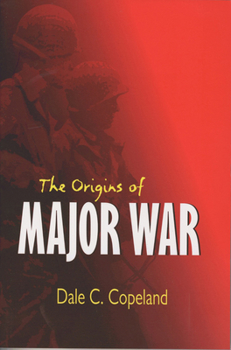Origins of Major War
(Part of the Cornell Studies in Security Affairs Series)
Select Format
Select Condition 
Book Overview
One of the most important questions of human existence is what drives nations to war--especially massive, system-threatening war. Much military history focuses on the who, when, and where of war. In this riveting book, Dale C. Copeland brings attention to bear on why governments make decisions that lead to, sustain, and intensify conflicts.Copeland presents detailed historical narratives of several twentieth-century cases, including World War I,...
Format:Paperback
Language:English
ISBN:0801487579
ISBN13:9780801487576
Release Date:August 2001
Publisher:Cornell University Press
Length:336 Pages
Weight:1.85 lbs.
Dimensions:0.8" x 6.1" x 9.2"
Age Range:18 years and up
Grade Range:Postsecondary and higher
Customer Reviews
1 rating
A Significant Addition To Understanding the Causes of War
Published by Thriftbooks.com User , 24 years ago
Dale Copeland's work represents a huge step forward in understanding why major wars occur. The debates over the origins of war have focused on whether or not the system is bipolar or multipolar, on the role of alliances in drawing states into war, on states trying to dominate the system, and other variables as well. Copeland has finally put all these differing views together into one coherent theory, adding a major causal mechanism: States' views of future power trends. States are most likely to start a major when when they see themselves in decline in relation to another state. They initiate a war to protect themselves from that growing states' threat to them in the near future. This theory explain why alliance do not really drag states into war, and why the number of poles is important, but not the determining factor. Bipolarity is more seen as more likely to lead to war, since a state must be willing to take on the entire system to succeed in a multipolar system, whereas it need only defeat one adversary in a bipolar world. Copeland backs up his theory with copious historical evidence, which seems to fit his theory. Furthermore, he breaks new ground in his empirical explanations. Historians will no doubt be intrigued by his contention that Germany deliberatly initiated the hostilities in World War One to defeat the rising Russian menace. He explains the Second World War in similiar terms. Unlike many of his contemporaries, he looks at pre-modern historical cases as well, dating back to Ancient Greece through the Napoleanic era. Finally, this book is very readable. Academic writing tends to be cluttered with jargon and in generally is very difficult to read. This book is not. Copeland writes with an easy style that is a pleasure to read. This is one of the few academic books that can be read by people in the field, and by those who are just interested in the question Copeland tries to answer. Highly recommended for everyone!





